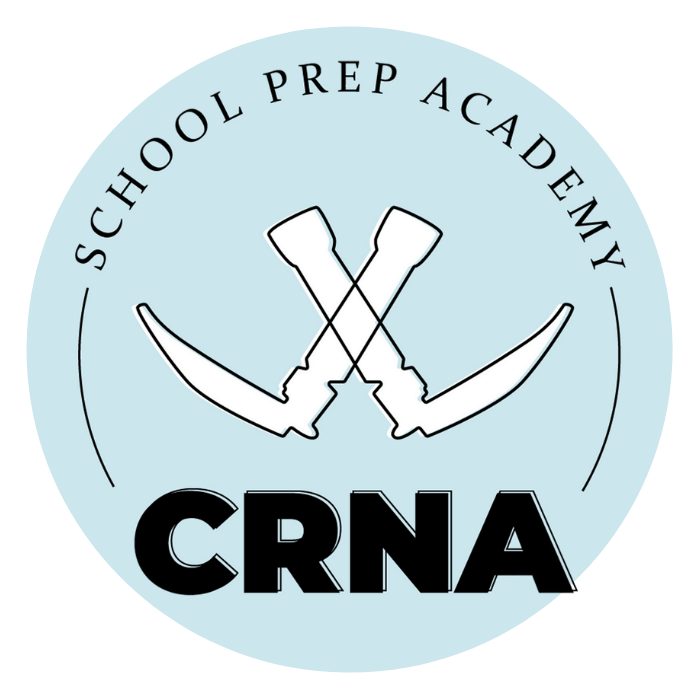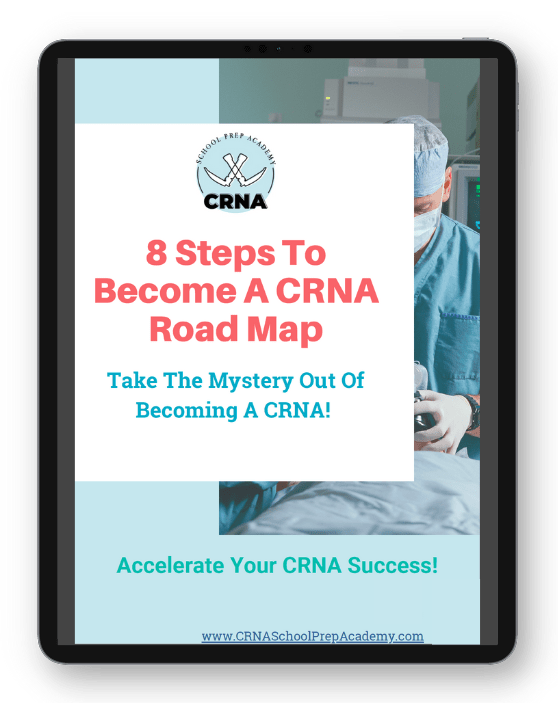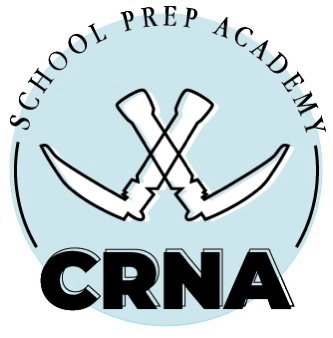
There are so many ways to become a CRNA. But if you want to reap the financial rewards and high job satisfaction fast, then there is no other way but to become one quicker! Jenny Finnell has your back as she breaks down the fastest way to become a CRNA. She outlines multiple pathways to get into a CRNA program and weighs in on both the pros and cons. On top of that, Jenny lays down the timeline on how long it takes to get there. Detailed and realistic, this episode is one you don’t want to miss!
Nursing Student To CRNA Accelerator WAITLIST Sign Up: https://www.cspaedu.com/Acceleratorp
Get access to planning tools, valuable CRNA Faculty guidance & mapped out courses that have been proven to accelerate your CRNA success! Become a member of CRNA School Prep Academy here:
https://www.crnaschoolprepacademy.com/join
Book a mock interview, personal statement critique, resume review and more at https://www.TeachRN.com
Join the CSPA email list: https://www.cspaedu.com/podcast-email
Send Jenny an email or make a podcast request!
Hello@CRNASchoolPrepAcademy.com
—
Watch the episode here
Listen to the podcast here
The Fastest Way To Become A CRNA
What is the fastest way to become a CRNA? The reality is the quicker you become a CRNA, the quicker you are going to be able to reap the financial rewards and the high job satisfaction that comes with this career. In this episode, I’m going to outline the different ways to become a CRNA and the timeline that goes with each one of those paths. Be sure to stay to the end because I’m saving the fastest path for last. Let’s get into the episode.
—
I’m so excited and honored to be here with you every week. Thank you so much for tuning in. If you are a new reader, welcome. I’m so excited you found me here. Be sure to subscribe, so you do not miss a single episode. We are going to talk about what’s the fastest way to become a CRNA. I have been mentoring students now for a few years, officially with CRNA School Prep Academy.
I’ve seen a lot of different pathways and talked a lot about program faculty. It’s allowed me to see, “How do people come into this career path? What are some obstacles these particular pathways face?” Essentially, what we do inside CRNA School Prep Academy is help people fast-track their success because who doesn’t want to become a CRNA as soon as possible? We all would raise our hands and say, “Heck yes, get me into CRNA school, Jenny.” That’s what people come to us for because they want to gain acceptance, not in five years or tomorrow.
For Those With MSN Or DNP
The first path that I’m going to discuss with you is if you already have your MSN or DNP. Some people already have their Master’s in Nursing or Doctoral degree. Where I see this come into play is where they go get their MSN, become an acute care NP or even an FNP. They decide, “This isn’t for me. I’m going to go back to become a CRNA.” A lot of times, what I’ve found happens is they were interested in CRNA. They wanted CRNA but questioned or doubted their ability to become a CRNA.
They gave up on their dream, which is heartbreaking. I want to make sure that I can alleviate these fears for you. If you come to CRNA School Prep Academy, one area that we work well with is giving you the courage and the confidence to take action on your dream. When students come into the academy who already have their MSN or DNP, you are looking at 5 to 7 years to get your Master’s or even 6 to 8 years to get your Doctoral degree. This depends on how quickly they go back for their MSN versus their DNP.
The other issue that I see often with this type of career path that could maybe add some years onto your CRNA journey is their ICU experience. How recent is their ICU experience? Many who go pursue their Master’s or their DNP go into more management roles versus clinical roles. They somewhat leave the bedside or even leave the ICU altogether when they go pursue other degrees. Some schools will accept ICU experience within the last 2 to 3 years.
However, you are always going to be in a better position if you have more current ICU experience. If you are out of the bedside for 2 to 3 years and you apply to CRNA school, you are going to be up against candidates who are actively currently working in the ICU. In fact, I will never forget when I did an interview with Anna Reese, a newly accepted SRNA. I brought her to the show to talk about her travel nursing experience in CRNA school. Go back and read that episode.
She even said that when she had a friend who interviewed at the same school she interviewed, they asked her friend, “Why are you the only application who’s not currently working in the ICU?” They still interviewed her because clearly, she was a good applicant but it didn’t give her that cutting edge, competitive nature they were looking for. They even questioned, “Why should we consider you when you are the only one who’s technically not currently working in the ICU?” Consider that prior to assuming that, because you’ve had ICU experience, you are okay to apply. It’s always putting your best foot forward if you go back to the ICU for a time.
If your hospital pays for your master's degree, it could be a waste of time if you really truly want CRNA. Click To TweetIt doesn’t have to be for two years, even a year. Go back and work for six months and then apply to CRNA school so that you can show them that you’ve taken an active step to go back to the ICU again prior to applying to CRNA school. That is one thing that can hinder your ability and how quickly you can go back for CRNA if you’ve taken this route. I’ve even had people say, “I’m an RT. I’ve gone back to get my BSN. Will my ICU time count from when I was an RT, a Respiratory Therapist?” The answer is no.
Unfortunately, they will look at your ICU experience once you become a nurse and start working as a nurse in the ICU. I’ve also seen students take educational or management roles. Technically, they leave the bedside. They are still in the ICU but not at the bedside. I don’t think this is going to be looked very favorably upon you as an applicant to these programs if you are not the one at the bedside, titrating the drips, dealing with the hemodynamics, ventilator issues, and being the thick of the pathophysiology process of the ICU patient.
If you are looking at this role, you are looking at approximately 5 to 7 years to get your MSN and 6 to 8 years to get your Doctoral degree. Overall, you still have to depend on your ICU experience which can set you up to be anywhere from 8 to 10 years with ICU experience or 9 to 12 years without ICU experience. I also want to point out the fact that I see a lot of these types of students go back for their MSN or not too many go for DNP. That’s not usually something that people strive to do. I don’t blame them. I’m going to go back for my DNP but I don’t want to.
I don’t think anyone strives for DNP unless they are interested in research, which is great. I would say the vast majority have their MSN because they thought, “I have a backup plan. I will get my FNP or my acute care NP, and maybe I will make CRNA school work. The problem with this is it looks like you are diverting from the course or maybe even they go into education. They do some extra coursework to get an Educator degree. That’s a Master’s degree. It looks like you are diverting away from the course.
I also encourage you to think about it this way. Many people say, “I will get my MSN. It’s paid for. I will boost my GPA.” This is a mistake. This could be a very timely and costly mistake because even if your hospital pays for your Master’s degree, it could be a waste of time if you truly want CRNA. Here’s why. Your overall GPA and your Science GPA are two different components of your application. These schools look very heavily on your Science GPA, and you are not going to be taking a ton of additional science courses in your MSN.
You might have a couple but you are not going to be making up for a low Science GPA by getting your Master’s. Your overall GPA may look great but they care more about your Science GPA. If things like Chemistry, Physiology, Physics, Biology, Statistics, Algebra or grad pharm could maybe play into your overall Science GPA. Make note that schools look at certain sciences.
They are not all cookie cutter, as far as what sciences they look at. Some of them look out more than others. You are only going to find this out by going open houses and talking to the programs themselves. If your issue is a low Science GPA, the answer is usually not getting your Master’s. It’s usually retaking some Science courses to boost your Science GPA and skipping the Master’s altogether.
It would save you time even if you are not paying for it. Time is money. Every year, if you don’t get into CRNA school, you are losing about $100,000 in salary. If you spend an extra 2 to 3 years getting a Master’s because you think it’s going to help you, you could be losing $200,000 to $300,000. That’s why it’s costly, even if it’s paid for by your hospital. Assess your Science GPA, know where you stand with that, and reach out.

I also suggest that if you know this is an area that has a weakness for you, as far as your Science GPA, I encourage you to look for programs that do replacements versus averaging. Some programs will average two grades. Some programs will take the higher grade. Knowing those programs ahead of time is going to allow you to know where you can apply that’s going to give you the best advantage for the work that you are putting in.
If you are going through all the extra work of retaking a course, and you have flexibility in where you apply to school, look for a school that’s going to give you a higher boost in your Science GPA than the one that won’t. That’s something that you should at least consider when you are applying to certain schools for CRNA. The total time for this pathway is about 8 to 10 years. If you have ICU experience, if you have to go back to the ICU or you don’t have any ICU experience, now you are looking at 9 to 12 years of time to become a CRNA. That’s path number one.
A Bachelor’s In Science With An ADN
Path number two is having a Bachelor’s in Science with an ADN. Please make note that not all schools will accept this pathway. It is dependent on your school. You have to do your own research. If you have a Bachelor’s in Science, you are going to have to find a CRNA program that will accept a Bachelor’s in Science, along with an ADN. A Bachelor’s in Science is a 4-year degree, plus 2 years on the ADN. You are looking at about 6 years and ICU experience of 1 to 2 years.
Where this pathway can maybe slow you down a little bit is the fact that you won’t have to start your ICU experience until after you get your ADN. This means that six years is when you officially can start working as an ICU nurse, now that you have your ADN. You should always work as a CNA prior to that. If you anticipate ADNs, if you are going from a BS and ADN, start working as a CNA or a nurse’s aide in the ICU, preferably. This will open up doors for residency programs and maybe even a direct hire into the ICU.
This pathway is the next longest because you can’t start your ICU experience until after you have your ADN. The total time for this pathway is around 7 to 8 years before you can even apply to CRNA school. The total time is around 10 to 11 years to become a CRNA. One thing that this affects this pathway in either a very beneficial or hindersome way is your Science GPA, coming back to that again.
A Bachelor’s in Science is probably a very heavy related science field. It could be a Bachelor’s in Chemistry or a Bachelor’s in Biology or whatever it is. You might have a lot of science courses under your belt already. This could be great if that Science GPA is high but if that Science GPA is low, when I say low, especially under a 3.0, even if it’s 3.1, 3.2 or 3.3 is starting to get borderline, not competitive but it might be okay. The average GPA, in general, is 3.5 for CRNA school.
If you are at a 3.4, that’s okay. The 3.3 is you are teetering. You probably need a little bit of a boost to make yourself a little more competitive, knowing that the average is right around a 3.5 Science GPA and GPA overall, although some programs are higher than that. In some programs’ the average GPA is more like a 3.7. This depends on the school and the type of applicants they get to their program.
Back to my point is that if you have a lot of sciences under your belt and your Science GPA is low, it’s going to be incredibly hard to boost that Science GPA. This is again where you want to start looking for schools that would replace the grade versus averaging the grade. Some schools will say, “If they retook this Chemistry, we will take the higher Chemistry grade and average it into their Science GPA versus averaging the two and making up their Science GPA.”
Time is money. Every year you don't get into CRNA school, you lose about a hundred thousand dollars in salary. Click To TweetThe more credits you have under your belt, the harder it’s going to be to budget. If you have a 3.0 but you could have so many credits that even if you got an A, it barely raises you to have a 3.09. You can’t even make a 3.1 by taking another Science course. This is where you are going to get the most bang for your buck by applying to schools that will replace versus average. The total time again for this pathway is 10 to 11 years to become a CRNA.
We are onto pathway number three, which is getting a traditional BSN, which is four years. This is for all of these pathways. These are the quickest routes. A lot of people take longer than this. A lot of it depends on whether you are accepted the first time into your College of Nursing; including myself, I did not get into the College of Nursing the first time I applied. It took me 5 years to get a 4-year degree.
Technically, get your BSN in four years. You are going to spend 1 to 2 years getting your ICU experience. Working as a CNA again is important. They called us SNAs because we were a Student Nurse Assistant. The difference was I was in nursing school when I had to wait. I did many hours in nursing school. I could apply for the SNA position versus if you go straight for CNA, you have to take a little course, and I forget how much it costs but it does cost money to become a CNA.
Work as a CNA, get some experience under your belt as far as hospital work and get into the ICU, that’s a repetitive theme, get into the ICU as a nurse’s aide to fast-track your CRNA success. You are looking at 1 to 2 years, and then CRNA school is 3 years. You are looking at a total of 8 to 9 years to become a CRNA. If you get your BSN in 4, 1 year of ICU experience, and 3 years of CRNA school, that’s 8 years. You could be fast-tracking your success with this pathway.
Getting ADN Plus A BSN
The biggest hindrance to this pathway is the fact that your BSN can make or break as far as how long it’s going to take you, and getting straight into the ICU. Those are two things to consider. “How long has your BSN going to take you, and how quickly can you get into the ICU after school?” Are you ready for the fastest pathway? You probably already know at this point what it is because I haven’t mentioned it yet. The fastest pathway to becoming a CRNA is getting your ADN plus your BSN.
This is probably the most common way that I see these days for people to take to become a nurse. I’m not going to lie. I don’t know if I even was aware of this pathway back when I went to get my Nursing degree. I had no one in my family who was in the medical field, and neither one of my parents even went to college. If I had known about this pathway, I would have considered it because it’s way less expensive and it’s quicker. It could be done very well.
I’m going to go over some little nuances that you have to be aware of though when you pick this pathway but by far is the quickest way. Essentially, if you get your ADN in anywhere from 18 to 24 months, most people do in about 24 months, then you are spending, on average about one year getting your BSN. The reason why this pathway is so quick is that while you are getting your BSN, you can be working in the ICU as a nurse. You already have that ICU experience under your belt by the time you become a BSN nurse.
Therefore, you can technically apply to CRNA school as soon as you get your BSN. That’s why this pathway is by far the quickest. You can accelerate your path in the CRNA if you get your ADN first, which is 18 to 24 months and work on getting your BSN as you are working in the ICU. Work as a CNA as you get your ADN. You get your foot in the door and hopefully get into a nurse residency program.

What I want to warn you on this pathway is that not all ICUs will hire an ADN-prepared nurse, some of them require a BSN to go into the ICU. I know there are still plenty of ICUs that do take ADN-prepared nurses. I am stating a fact that I know to be true, so be cognizant of this. When you are getting your ADN, you are seeking out jobs that will take nurses into the ICU with an ADN.
This can happen while you are working as a CNA, getting your ADN. Find out, “Will they accept me into the ICU as a fresh new grad with an ADN.” If the answer is no, go look somewhere else for a CNA job, into a hospital where you can get your foot into the door, into the ICU, that will take an ADN nurse. That’s my precautionary advice for you on this path.
In as little as three years, you can have your BSN and you can already have one year of ICU experience. This is by far the fastest pathway. Some other factors that I want you to be aware of if you pick this path be aware of pass/fail programs for BSN. I feel like mostly, BSN programs offer this where it’s a pass/fail. The problem with pass/fail is it will shoot your GPA in the foot. A passing grade in a pass/fail program is equivalent to a 3.0.
These schools are going to be looking at your ADN, which could be okay but they are also looking at your Science GPA. Keep that in mind, your Science score and your ADN. You will have that going for you as long as again, that it is not pass/fail. Most of the past/fails I run into are for BSN programs. That being said, it’s going to knock your overall GPA down, when the average GPA is a 3.5, 3.7, if you only have a 3.2 or maybe even barely a 3.0. The other thing I see people do is they make this common mistake where maybe their ADN is only a 2.8 but they have a 4.0 in their BSN.
They assume I got a 4.0 on my BSN. My overall GPA is 3.5. I should be okay. The reality is, though, your ADN GPA is so low and that’s where a lot of your sciences are. They will look at your sciences and your ADN. The BSN aspect is not super important when it comes to applying to CRNA school. That affects your overall GPA, and you have to make sure that you don’t do a pass/fail program.
The other thing about getting a Nursing degree in this pathway is you have to be wary of accreditation. I’m not saying that a traditional BSN school will not have accreditation issues possibly but most traditional BSN programs are going to be both nationally and regionally accredited, where I see more often these ADN and BSN programs, maybe one or the other.
They may not be both nationally and regionally accredited. A situation that happened to one of our students was that he went to a nationally accredited nursing program to get his BSN, but it was not regionally accredited. His programs, and this is in Florida, require both. It means you have to be nationally and regionally accredited, so they won’t accept his BSN. He can’t apply to CRNA school.
He has 2 schools out of 8 or 10 he said that he can even apply to, and that stinks. You’ve narrowed your opportunity by simply not taking your BSN at a place that’s both nationally and regionally accredited. Look for the accreditation, check to make sure it’s both nationally and regionally accredited, and avoid pass/fail.
The more credits you have under your belt, the harder it's going to actually budget. Click To TweetYou are looking at 1 to 2 years of ICU experience. It depends on what the school requires. Some schools required 1, and some required 2. Another thing to think about during this entire process is the ICU nurse residency. Not too many hospitals, at least I don’t think anymore, hire directly into the ICU. Back when I was a nurse’s aide, a lot of ADN nurses that were nurse’s aides in that ICU would get their ADN degree and get direct hire. They didn’t have to do a residency. They were direct hires into the unit as a nurse.
That doesn’t happen very often anymore. I’m not saying it doesn’t happen. I’m saying this is at a low Level 1 trauma hospital too. Not just a community hospital, this was at a sick ICU. Right around when I was graduating, they eliminated that option. For all new grad nurses, not only did you have to have a BSN but you had to go through the nurse residency program to get hired into the ICU as a new grad without prior ICU experience.
That changed, and a lot of hospitals have moved toward that. What I want to warn you about residency programs is they vary in length extremely. My residency was three months, plus maybe a month of orientation with another nurse. Part of my hours was going to this residency project where I worked on a research project. It only lasted four months, and some of these residency programs are year-long.
Some programs will not give you a letter of reference prior to you completing your residency. Some won’t even give you a lot of references unless you have been working there for over two years. I encourage you when you work as a nurse’s aide to find this information out, talk to other nurses, especially nurses that are going back to get their Master’s or CRNA school and say, “Did you have any issues getting a reference here? I know you started a year ago. Did you have any issues getting that reference for grad school?”
This is also why working as a nurse’s aide is so crucial and important because you can get some insight before it’s too late. If you wait until after you graduate to find this out, you are like, “I accepted a nursing position. Now I have to look for another nursing position and start all over again?” Some of these residency programs hold you to an agreement where you have to give them a certain time. You get faced with fines or you are on a do not hire list going forward. You don’t want to break a contract with a hospital.
You have to find out this information prior to accepting a position. It stinks when I find nurses who are trying to fast-track it and run into these nuances that are annoying, that they’ve already accepted a position. They are already in the thick of it. They are already in the residency program. They are getting trained and doing all the things, and now they find out they can’t get a reference for two years and wanted to apply at that one-year mark. It’s crushing.
Now they are held under a contract. Had you been a nurse’s aide in that unit and talked to other nurses about this particular topic, you could have made your exit then and gone and worked as a nurse’s aide at another hospital that doesn’t have that rule. I want to give you that fair piece of a warning to make sure that there are no stipulations like that.
The other thing is sometimes, I’ve seen this happen a lot too, especially with everything that went down in the last few years, and everyone leaving the bedside. Nurse managers are dropping like flies. We will have a student who has a longstanding nurse manager, and then they leave. They are like, “Great. I’m getting ready to do my application. The person who knew me best is now gone. Now we have this new person who doesn’t know me, who’s never worked with me, and I have to ask them for a lot of references.” That’s the reality of it.

If you know your longstanding manager is going to be leaving and you are going to be applying to CRNA school within 3 to 4 months, get the reference before they officially go. Ask them for that reference and say, “Congratulations on your new position” or “I’m sad to see you go but I appreciate everything you’ve done. Can you please write me a letter of reference for CRNA school? You know me the best. I’ve worked with you. I would be honored and grateful if you could do this for me before you go.”
I can’t imagine them saying no. If you can plan ahead like this and have a game plan of when you need that reference, it’s okay to ask for 3 to 4 months early, especially if you have already been in the ICU working for 7 or 8 months, ask for that letter of reference. That way, when your application cycle opens, you already have that piece of the puzzle done. That’s another piece of advice that I see happen. Not often but it does happen more than I would like to see it happen.
Technically, if you take this fast pathway, you can be prepping for your CRNA application while you are getting your BSN. This sounds like a lot to me anyways. It sounds like holy smokes but I know people do it. People can graduate from CRNA school or be in CRNA school at 25 or 24 years old. The youngest girl in my class was 24 years old. She was done when she was 26. I was like, “That’s nice.” I do know it can be done. I would say that’s not the average.
If this is your mission to get in as fast as possible, this is the pathway you need to take. This is 3 years, plus 3 years of going to CRNA school. That’s six years total to become a CRNA. This is the fastest pathway to becoming a CRNA. The vast majority are going to need more time because, during that year, you are getting your BSN, you are going to be doing things like your CCRN, your GRE plus or minus if you need it, your personal statement, your shadowing experience, building up your resume with leadership and committee work, and making sure you have all the prerequisites.
Keep in mind that not all ADN programs cover the prereqs that are required for CRNA school, which could also delay you a little bit. This means maybe you never took Chemistry or maybe the Chemistry you took doesn’t meet the pre-requirement for your CRNA program. Ideally, while you are getting your ADN, you should be researching your CRNA school requirements at that point. That way, you know what your game plan is as soon as you get your ADN, as far as taking any pre reqs that you need and getting your BSN.
You are going to be working to go this fast route. It’s possible. Keep in mind that some programs require things like grad stats prior to applying. You do have to make sure that you know what prereqs you need to apply to their program. Networking is huge. If you skip this step, you become a CRNA but it will make your life so much smoother, easier, less scary, and less stressful if you have a good network behind you. These could be coworkers who share the same passion and pathways as you.
These could be current students who are in a program that you want to go to. These could be CRNAs who take you under their wings and allow shadowing opportunities and understanding of this profession. This is also why it’s important that you are plugging into CRNA School Prep Academy like you are doing here on this episode, becoming a CRNA School Prep Academy student, going to our events and live Q&As, and connecting with program faculty.
We are giving you the tools to build this network, to help you to foster those relationships and understanding. When schools grill you on why you want to become a CRNA, you are going to be very knowledgeable. The mistake I also see when people gun it to CRNA school is they get this idea and this idolization that they want to become a CRNA. Realistically, sometimes they severely lack the knowledge of what a CRNA does.
You will become a CRNA, but it’ll make your life so much smoother, easier, less scary, and less stressful if you have a good network behind you. Click To TweetThey put us up on this pedestal. I know that’s what they want to do but haven’t spent enough time digging into all the nitty gritty of what we do. They don’t spend time shadowing. They know what’s a good career. They make a lot of money. They want to do it and have high autonomy, all the stuff that you read on Google is surface level. These schools are going to be looking for more than that. Please promise me this. If you take anything from this whole episode, if you want to gun it to CRNA school, that’s cool. High five to you, and more power to you. I’m rooting for you.
Promise me that you are still going to take all the time that you possibly can to get to know this profession. Get to understand it. Ask questions, go to open houses, network, and know why more than just autonomy and the pay. How do you foresee yourself in this role day in, day out, bad times, good times, and all the in between?
You have to understand the good and the bad because you don’t want to make this decision, go to an expensive program and spend three years of your life going for a degree that after you get in it, you are like, “This is not what I want,” which is back towards like people going for the MSN. When they know deep down, it’s not what they want. They are like, “I got my MSN, but now, I’m going to go back for CRNA because it’s never what I wanted.”
Don’t do that to yourself. Promise me. If you already have done that to yourself, I’m sorry, hugs. It will be okay. I’m hoping that this episode catches some of you early enough in the process to where you can think about these things ahead of time and plan for them. I want to leave you with this, the average or the majority of people who pursue CRNA are going to take 10 to 12 years to become a CRNA.
Remember, this is your timeline. We have had students in CRNA School Prep Academy who are 52 years old by the time they go back for CRNA. This is the time they decide to pursue it, not get in, that they are 52 and like, “I’m going to go back for CRNA school.”
They have been an ICU nurse or maybe not. Maybe they’ve gone back and out of the ICU but now they are going back to the ICU. They have taken some courses again. They are ready to go back to CRNA school. Their kids are grown and out of the house. They are empty nesters but want to change career paths. That is okay because it’s your timeline. It’s your life. Obviously, run the numbers, estimate when you want to retire and make sure it makes sense financially. Maybe they already have a nest egg saved and can afford to pay for it in cash.
Maybe they don’t have to take out loans or maybe they are okay with taking out loans, knowing that they are going to pay it off in a good amount of time because they don’t have any other financial responsibilities. Their kids are no longer on their bills. Keep in mind that it doesn’t matter what your coworkers are doing, your friend’s doing, your significant other, your sister, your brother or anyone else’s pursuing CRNA. It does not matter when they get in. It’s all about you and what works for your life.
Have those babies, their sweet time is precious. CRNA school will always be here but if you live life and things get in the way, you make sure you stay on the path by staying involved, connected, and grounded in your passion for pursuing CRNA. Tuning into this podcast every week will do that for you. I want to give you that comfort and that grace to do this at your own pace and don’t feel like it has to be this year, next year or the next year. It will happen.
You just have to stay on the path and be persistent. It will happen. Click To TweetYou have to stay on the path and be persistent. It will happen. I promise you. Reach out for help. Doing the same thing over and over again is going to produce the same results. If you want different results, you have to do something different. This is where a lot of students come to CRNA School Prep Academy who have faced rejection. I hope you come to us before you face rejection so you don’t get a rejection, but we are here to help. That’s our specialty. That’s what we do. We help you figure out a way that works for you. We help you figure out what these programs are looking for.
You have to rise to the occasion and do those things. If you do, a lot of these programs will be impressed. Those are the people they want in their program because they want people who take initiative, who do the things and go out of their way to become a CRNA, showing that drive and passion. Those are the ones who are more likely to be successful in their programs and as CRNA in general. I want to leave you with the fact that we are here for you, and be sure to check out CRNA School Prep Academy if you have not already. We have so many planning tools that will accelerate your path to becoming a CRNA.
I have an exciting announcement it’s early but I’m going to announce it. I’m going to share the waitlist. We are working on an accelerator course for nursing students. If you are reading this episode and are a Nursing student, this course is for you. It’s going to help you accelerate your CRNA path. We do have all of this inside of CSPA and the planning tools. If you are already a CSPA student, rest assured, we’ve got you. You have the best of the best. We have everything in CSPA. I know after years of doing this that there are a lot of nursing students who are starting their nursing school journey, who are not ready to commit to CSPA but who still want the help.
I want you to have the help to plan for your future and accelerate your success. We are building this accelerator course to provide you with these planning tools that are going to accelerate your success. We anticipate launching it in early 2023. There’s going to be a little bit of a wait but it’s going to be a wait well worth it. Sign up for the waitlist.
Make sure you get early bird access and pricing. I’m doing something fun in December 2022 that I’m not going to spill the beans on yet. You will be included in whatever we are doing in December as well if you sign up for the waitlist. Thank you so much for tuning in. As always, I appreciate you. I will see you next episode. Cheers to your future CRNA.
Important Links
Get access to planning tools, valuable CRNA Faculty guidance & mapped out courses that have been proven to accelerate your CRNA success! Become a member of CRNA School Prep Academy here:
https://www.crnaschoolprepacademy.com/join
Book a mock interview, personal statement critique, resume review and more at https://www.TeachRN.com
Join the CSPA email list: https://www.cspaedu.com/podcast-email
Send Jenny an email or make a podcast request!


